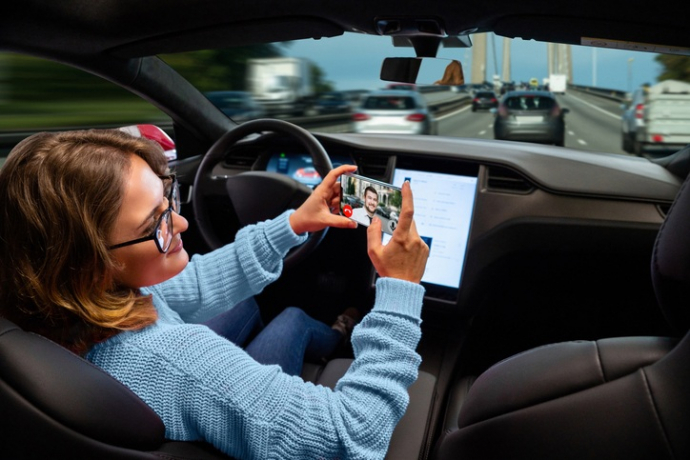
Nobody knows for certain how cyclists will avoid the dangers posed by driverless cars of the near future. Although research has been done into how automated vehicles (AVs) will detect and avoid pedestrians, the interactions between drivers and cyclists are more complex.
Researchers from the University of Glasgow have written a paper titled ‘Keep it Real: Investigating Driver-Cyclist Interaction in Real-World Traffic’, which makes recommendations for how AVs could work safely. One of the suggestions is for cyclists to wear ‘smart glasses’ that AVs could send messages to.
It’s not altogether clear what the messages would say, but what are the odds that “You don’t pay road tax” and other banalities will feature highly?
How will driverless cars recognise (and avoid) cyclists and pedestrians?
While autonomous vehicles will bristle with sensors and cameras, the tech is far from fool-proof when it comes to spotting people and bicycles. Transponders fitted to motorised vehicles will allow them to recognise each other, but pedestrians and cyclists will not automatically benefit from this safeguard.
The augmented reality glasses suggested in the Glasgow University paper are a form of so-called ‘beaconisation‘. These devices, that can be spotted automatically by sensor-equipped cars have already been given the official seal of approval in America and it seems likely the rest of world will follow suit.

It seems more and more likely that driverless car tech will place the responsibility for safety on other road users
On the face of it the idea might seem like a simple way to reduce the risk to pedestrians and cyclists from driverless cars, but it’s the latest example of victim blaming by the car industry.
Perhaps the most concerning aspect of beaconisation is what it means for those who don’t wear trackers? If you’re invisible to autonomous vehicles, will you be blamed if you’re crashed into?
Driverless cars – too good to be true?
If you think all the claims surrounding driverless cars sound too good to be true, you’re not alone. Christian Wolmar is an award-winning writer and broadcaster specialising in transport: “People say we’ve got 1.25m people killed on the world’s roads every year across the world – we will remove that danger – remove it with this technology. I’m not sure these driverless cars will ever be developed in the way that they envisage. There’s no guarantee that they actually will be safer. They will still have software that is programmed by human beings. The cars will still be on the roads in potential collisions.”
Christian Wolmar appears in our crowdfunded documentary Stop Killing our Children, which can be viewed in full on Vimeo
While there appears to be an inevitability about autonomous vehicles – with some carmakers claiming they’ll be on British roads by the end of the year – many questions about their safety remain unanswered. It’s hard to think of an aspect of life that wouldn’t be improved by a reduction in our dependency on cars; better air quality, safer streets, quieter neighbourhoods, more independent children, not to mention helping to mitigate the climate emergency. However, driverless cars do not offer a convincing solution. We need fewer cars, not fewer drivers.
The ethical choice
The ETA was established in 1990 as an ethical provider of green, reliable travel services. Over 30 years on, we continue to offer cycle insurance, breakdown cover and mobility scooter insurance while putting concern for the environment at the heart of all we do.
The Good Shopping Guide judges us to be the UK’s most ethical provider.

Stephen Lawrence
Until a few years ago I was quite skeptical about autonomous vehicles but then I saw a display in a vehicle showing the way the system identified other objects on the road. I realized at that point that it was seeing far more in a 360 degree angle than any driver ever could, and I realized that as a cyclist I probably would be safer with these cars than with conventionally human-driven ones. I have noticed that as the number of autonomous vehicles on the road increases the ‘problems’ they cause occur when they are too cautious. We have to make sure we use them well, but if we do, there will be benefits.
Robert Stephens
Driverless cars will focus on Driver safety to the detriment of pedestrian and cyclist safety!
Anthony
Taking the car to the airport? No worries about parking fees, just send it home to await the call to come back for you! Cars can end up driving twice as far – bad enough with a small payload (relative to its bulk) of a human or two, worse with no payload.
Time to pick the kids up from school – send the car to collect them. They can return home, get in by facial recognition. While you and partner are sat in the Maldives!